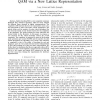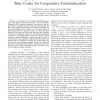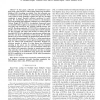412 search results - page 4 / 83 » New Set of Codes for the Maximum-Likelihood Decoding Problem |
GLOBECOM
2007
IEEE
14 years 3 days ago
2007
IEEE
— Sphere decoding (SD) is a low complexity maximum likelihood (ML) detection algorithm, which has been adapted for different linear channels in digital communications. The comple...
CORR
2007
Springer
13 years 5 months ago
2007
Springer
— A construction of a new family of distributed space time codes (DSTCs) having full diversity and low Maximum Likelihood (ML) decoding complexity is provided for the two phase b...
TWC
2008
13 years 5 months ago
2008
Space-time block codes (STBC) using coordinate interleaved orthogonal designs (CIOD) proposed recently by Khan and Rajan allow single-complex symbol decoding and offer higher data ...
CORR
2007
Springer
13 years 5 months ago
2007
Springer
Abstract— In this paper, collocated and distributed spacetime block codes (DSTBCs) which admit multi-group maximum likelihood (ML) decoding are studied. First the collocated case...
EUROCRYPT
2012
Springer
11 years 8 months ago
2012
Springer
Decoding random linear codes is a well studied problem with many applications in complexity theory and cryptography. The security of almost all coding and LPN/LWE-based schemes rel...



